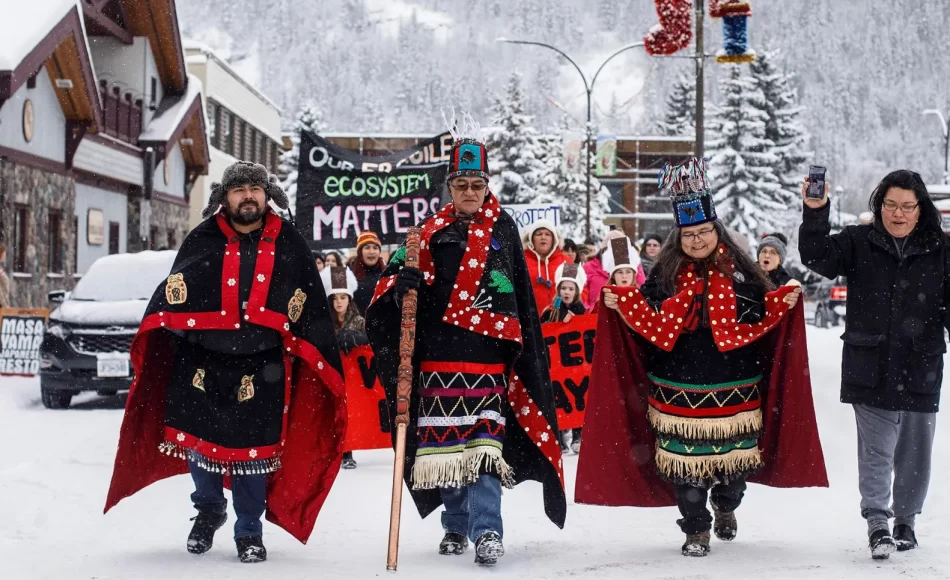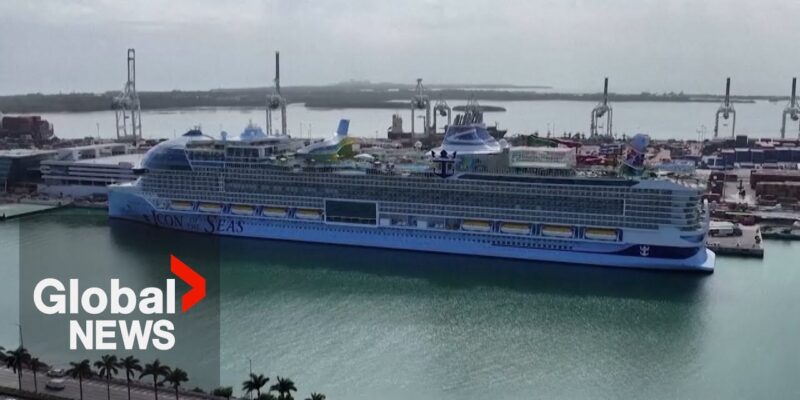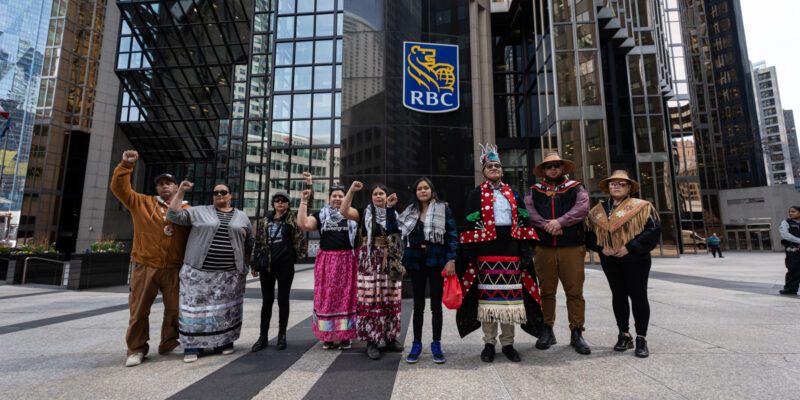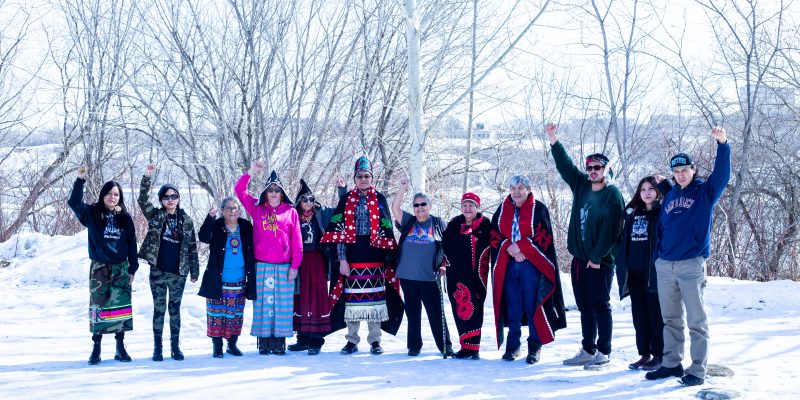
This op-ed was originally published on Rolling Stone written by Mark Ruffalo and Sleydo’ Molly Wickham
THE SCENE OPENS with a winding river. Snow covers the river banks. Moose drink from the water. It is silent, except for the river — a sacred source of sustenance for the Wet’suwet’en people, who have lived here for thousands of years.
Cut to police pointing guns, wielding batons, screaming at Indigenous elders. Wrapping themselves in ceremonial blankets, elders carry drums. With each passing day, the Wedzin Kwa river is at risk as a pipeline is forced through. Elders and hereditary chiefs defend the river and their ancestral land with their voices and their drums, which fill the cold night air with a somber sound. Within hours, police violently arrest elders and hereditary chiefs. Silenced drums echo through the forest.
This isn’t from a Hollywood movie. Five months ago, in northern British Columbia, Canada, the RCMP (Canada’s federal police) violently arrested — with semiautomatic weapons, lethal overwatch, K9 units and chainsaws — peaceful Indigenous land defenders. I, Chief Sleydo’, was among those arrested and removed from the territory.
City National Bank’s (CNB) parent company, Royal Bank of Canada (RBC), enabled this violence by bankrolling Coastal GasLink, a controversial 416-mile fracked-gas pipeline threatening the land, water, and rights of Wet’suwet’en People.
A few weeks ago, I, Mark Ruffalo — along with Scarlett Johansson, Taika Waititi, Robert Downey Jr., and many more — released a letter urging CNB’s parent company RBC to immediately divest from Coastal GasLink. CNB is known as “the bank of the stars.” If CNB’s parent company RBC doesn’t divest from Coastal GasLink, it won’t just be known for providing financial services to Hollywood, it will be known for steamrolling Indigenous rights. (RBC’s response can be read here.)
We come from different worlds. However, we both carry a deep desire for justice, for protecting people and the planet. That’s why we’re raising our voices together to show the world how RBC is financing the violation of Indigenous rights and making the climate emergency worse.
The United Nation’s Committee for the Elimination of Racial Discrimination (UN CERD) has repeatedly condemned the Coastal Gaslink fracked-gas pipeline, urging the Canadian government to halt the project immediately and seek Free, Prior, and Informed Consent from Wet’suwet’en hereditary chiefs, as well as for police to stand down and “immediately cease the forced eviction” of Wet’suwet’en people.
Yet as harassment and violence continue, RBC continues to bankroll the project, providing Coastal GasLink with $275 million in project finance, a co-financed $6.5 billion loan, a $40 million corporate loan, and $200 million in co-financed working capital, while serving as financial adviser for the fracked-gas pipeline.
Wet’suwet’en hereditary leaders never consented to the Coastal GasLink pipeline, despite RBC’s claims. TC Energy (the company behind the pipeline) was in charge of clearing the way for the pipeline and only reached out to elected leadership of reserve bands. Band councils and the elected chief system are a legacy of the Indian Act, designed to destroy Indigenous culture and steal the land. In 25 years, RBC had not met with the Wet’suwet’en hereditary chiefs, despite numerous requests, until recently. Only after high-profile customers of City National Bank learned that CNB’s parent company was implicated and started exerting pressure did RBC come to the table.
Wet’suwet’en hereditary chiefs took Canada to court in 1987 to get their land back, and in 1997, the Supreme Court of Canada acknowledged that Wet’suwet’en Aboriginal Title was never extinguished by Crown (Canadian) Title and that the rightful title holders were the hereditary chiefs, but the court stopped short of recognizing where that aboriginal title existed, leaving that for a future case or negotiation. In practice, Coastal GasLink and its financial backers are trespassing to build a fracked-gas pipeline.
Clearly, RBC finds it convenient for Coastal GasLink to “consult” with leaders without appropriate title to the territory, some of whom are not even on the pipeline route. Elected band councils are only responsible for reserves, making up 0.2 percent of Canada’s land mass, whereas the Hereditary System represents the entire Wet’suwet’en territory. TC Energy didn’t ask hereditary chiefs because the company knew the answer would be “no.” Instead, they pretend hereditary chiefs don’t exist. This is a prime example of erasure of First Nations people.
We oppose this fracked-gas pipeline not only for immediate threats, but also longer-term dangers of locking in decades of potent climate pollution. Coastal GasLink would carry fracked methane gas, which has “more than 80 times the warming power of carbon dioxide over the first 20 years after it reaches the atmosphere.” This is the opposite of the energy Canada should be embracing in a climate emergency, and the opposite of RBC’s rhetoric around climate change and First Nations rights.
This is bigger than one pipeline. This is about Wet’suwet’en people, and all sovereign Indigenous Nations, who are detrimentally impacted by fossil-fuel extraction, who should be free to live as who they were meant to be — without being forcibly removed and undermined. What’s happening right now in so-called Canada is an ongoing erasure and removal of Indigenous people.
Trampling Indigenous rights, threatening drinking water, and exacerbating the climate crisis — all in the name of shareholder payouts. When the dust clears and decades go by, RBC and its wholly-owned subsidiary CNB risk being on the wrong side of history.
But it’s never too late to do the right thing. CNB’s parent company RBC must immediately divest from Coastal GasLink. Or Hollywood and many others will just divest from them.




